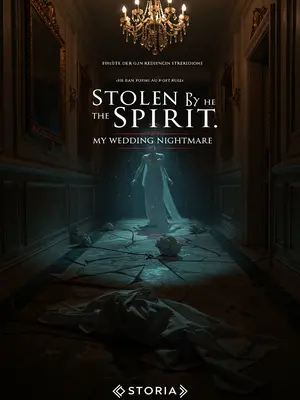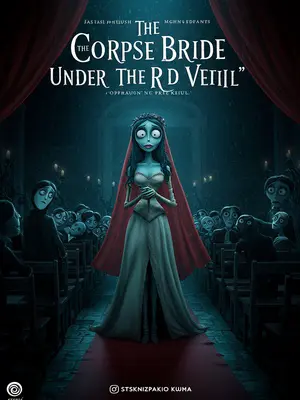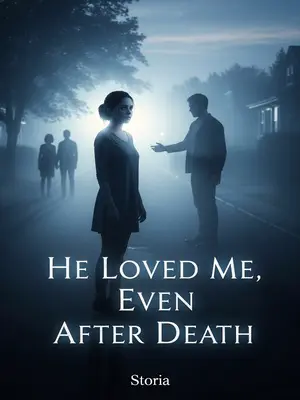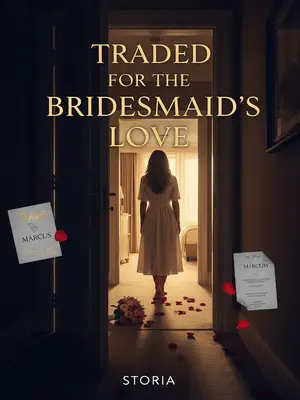Chapter 1: The Night I Died for Love
The night Eli got married, I died—out there, just beyond the city, right where the northern plains begin. Funny how it happens. Sometimes, you can feel the end coming long before it arrives, and still, it catches you off guard.
The air cut straight through me—cold, sharp, laced with the heavy metallic bite of gunpowder. Somewhere underneath, I caught the dry, sweet scent of prairie grass, the kind that clings to your boots and fills your lungs out here. The sky above stretched wide and endless, stars scattered like spilled salt across black velvet. I remember thinking how strange it was, dying in this empty place while somewhere else, people toasted and laughed under golden chandeliers. Life kept spinning on, indifferent.
Honestly, I could’ve dodged that bullet, you know? But I didn’t want to. I swear, I was just so tired…
Tired in a way that settles deep into your bones—like you’ve been carrying around some secret hope for too long. The kind of tired no amount of sleep or sunshine can fix. It just sits inside you, heavy and silent. I let the world go still, let everything fade out, and just waited. Maybe I wanted it that way.
Eli, listen, in the end, I still couldn’t become your wife…
My last thought was for you, Eli. I wanted you to know—really know—that even if I never made it down the aisle, even if I never wore white for you, I loved you. Always. I guess some things just aren’t meant to be, no matter how much you wish they were. That’s life, right?
My name’s Autumn Jennings. It’s been two years now since I landed in someone else’s story—got cast as the supporting character in a life that isn’t mine.
Sometimes, late at night, I wonder if this is all some weird cosmic joke—me, living a life that isn’t really mine, loving people who never quite see me for who I am. Funny, right? I always figured I’d get to be the main character at least once. Guess not this time.
When I first got here, I was just a baby. My mom’s name is Rachel Shaw. In the original book, she only got a single line: “The legitimate daughter of the Shaw family in Maple Heights, proud and willful by nature.”
But to me, my mom’s the gentlest soul in the world. I remember the smell of her perfume, the way her arms felt safe around me, and how she’d hum lullabies when she thought I was asleep.
She was always so quiet. When she had a free moment, she’d cradle me close and whisper, “my little girl… my little girl…” again and again, like she was trying to make the words last forever. Sometimes, she’d just sit with me, holding me tight, her eyes drifting somewhere far away, her voice soft as a prayer.
Her hands were soft and always carried that faint scent of lavender—just like the sachets she kept tucked in the linen closet. She’d rock me in the old oak chair by the window, humming hymns under her breath. Sometimes, she’d close her eyes and breathe me in, as if she was memorizing every bit of me. I never heard her raise her voice. Not once.
My dad? That’s Samuel Jennings. He was always a little bit of a mystery to me.
He didn’t visit often, and when he did, it was always when Mom wasn’t around—sneaking in just to hold me for a while.
He’d tiptoe into the nursery like he was breaking the law, careful not to wake anybody. When he picked me up, it was awkward—like he’d read about babies in a manual but never actually held one before. His hands were big and warm, and sometimes he’d whisper stories about far-off places, or tell me how he met Mom. There was always something sad in his eyes, like he was sorry for something he couldn’t say out loud.
He held me kind of clumsily, so careful, but I could feel how much he cared. Even if he wasn’t great at showing it, the love was there. I could tell.
So I always smiled at him. Every single time.
Every time I smiled, he’d just light up—grin like an idiot, all goofy and warm, so different from the elegant, distant man the book described. I’d catch him looking at me like I’d just given him the world. Those moments felt like our own secret, tucked away from everyone else. It made me wonder if maybe, just maybe, stories get things wrong sometimes.
He’d laugh, his whole face lighting up, and for a second he looked years younger, almost like a boy again. I’d giggle, and he’d act like I’d handed him the moon. Sometimes I’d think, maybe the world doesn’t see the real him. Maybe I do.
I don’t get it. I know my dad loves me. I just do.
But everyone else says Sam Jennings doesn’t like Rachel Shaw, and that means he doesn’t like their daughter—me. They say he never even visits.
People love to talk, especially in small towns like Maple Heights. They whisper over church potlucks and backyard fences, making up stories as they go. Maybe folks just need someone to blame when things fall apart. Maybe they’re just plain wrong.
But that year, when I was two, my mom brought me back to Maple Heights. I remember the train ride, the way she squeezed me close as the world zipped by outside.
We left the South behind—warm sun, crepe myrtles, the sound of cicadas at dusk—and came back to the cold, echoing halls of the Whitmore estate. I remember the chill in the air, the way the stone floors felt under my bare feet, and how my mom’s arms held me tighter than ever.
So people started talking again. Rachel Shaw is proud and willful, they’d say. She and Sam Jennings don’t get along as husband and wife. I’d hear it in the grocery store, whispered behind hands.
Everyone pitied my dad, always wondering why he never divorced her. Like it was any of their business.
There was always some neighbor with that look—shaking her head, sighing about "poor Sam Jennings" and how "Rachel never did fit in here." People always think they know the whole story. Makes you laugh, sometimes.
Honestly, I just wondered how people found so much time to gossip. From where I stood, my dad loved me and my mom plenty. Maybe that was all that mattered.
After we got to Maple Heights, my mom grew even quieter. She spent her days in church, lighting candles, praying. I’d see her slip out before breakfast, her face set, her eyes tired.
The church was old and drafty, stained glass spilling color across the pews. My mom would kneel there for hours, lips moving in silent prayer, her back held straight—not stiff, but determined. I’d stand in the doorway, watching her, wondering what she was asking for. Or maybe what she was trying to forget.
So Grandma raised me, pretty much from the start. She took over, filled the house with her laughter and her cinnamon rolls, and made sure I never felt alone.
Oh, and let’s not forget—there was this wild, mischievous little rascal with a crooked grin and eyes that sparkled with trouble. He was always getting into something, always trying to make me laugh. Hard to believe that kind of troublemaker would grow up to be the male lead—the legendary future Cavalry Commander of the Midwest.
His name was Eli Shaw. He was the kind of kid who could charm the socks off a Sunday school teacher and still wind up in detention by lunchtime. He’d sneak frogs into my shoes, tie my braids together, and somehow always talk his way out of trouble. There was something wild in him—like he belonged to the wind and the endless fields more than he did to any house.
Oh, right—I forgot to introduce myself. I’m Autumn Jennings. People call me the supporting character, but I was never the villain. In the original story, I loved Eli Shaw and never got him. In the end, I took my own life in a fire. That’s what the book said, anyway.
And the real female lead of this book? That’s Savannah Reed. She was always the one at the center of the story, the one everyone watched.
Savannah was everything I wasn’t—bright, beautiful, destined for greatness. She had that kind of effortless confidence that made people follow her without even thinking. The world just seemed to bend toward her. I was just the shadow in the background, watching it all happen.
The Shaw family in Maple Heights—the Whitmore estate—was three generations deep in military service. Back in the day, they even had a First Lady Shaw in the White House. The family was practically legend.
Their house was packed with old photos—sepia portraits of stern-faced men in uniform, medals gleaming on their chests. Grandma would tell stories about uncles and grandfathers who’d fought in wars I’d only read about. The Whitmore estate felt like a museum sometimes, every room thick with memories and the faint smell of lemon polish.
But by Eli’s generation, the family line had thinned out. There were just two brothers in our generation: Mason and Eli. And as for girls, there was only me—the cousin.
Family gatherings felt small, almost intimate, just a few of us rattling around that big old house. Sometimes, when it was quiet, I’d wonder if Grandma ever felt lonely, surrounded by all those memories and so few people left.
So even though we were living in someone else’s house, Grandma Shaw—my mom’s mom—spoiled me rotten. She made sure I never felt like an outsider.













